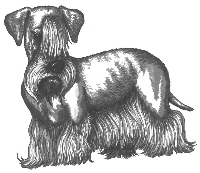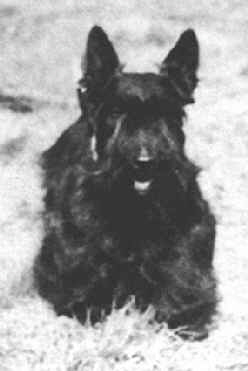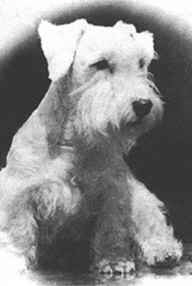Breed Info
History

The breed was founded by Frantisek Horak (1909-1996) in Czech Republic. Also known as a Bohemian Terrier or Czech Terrier, the breed is relatively new and was developed in the last century. Horak wanted to breed horses and ponies from a young age and at the age of 9, he was allowed to start breeding dogs and after WWII, he started to breed ponies as well. At an older age, Horak became a geneticist and worked for many years at the Academy of Science in Prague. During his breeding of dogs, he became well known for his Scottish and Sealyham Terriers, which he used in hunting near his home. Horak’s kennel was named ‘Lovu Zdar’ which means ‘Successful Hunter’, this is true with both his Scotties and Sealyhams and then later this can be seen with the Cesky.
Horak got his first Scottish Terrier in 1932, however, he was concerned that it was too aggressive. He started hunting with the dog and bred Scotties for this purpose. In 1934 he met a Sealyham owner and had a conversation about the two breeds. At this point he believed that the product of this crossing could create a better hunting dog which was capable of working as a pack and could go to ground and fit in burrows too small for its parent breeds.
Donka Lovu Zdar and Sealyham Terrier dog, Buganier Urquelle produced the first Cesky terrier. He was named Adam Lovu Zdar and was born on 25th December 1949. During this breeding, Horak kept detailed records of blood lines and in the years that followed, he worked to set the characteristics he was looking for. It is from this that an accurate account for the breed’s history can be seen. Unfortunately, this Cesky was shot by a careless hunter in 1950 causing a setback.
Horak repeated his breeding, however, this time he used the Scottish Terrier, Scotch Rose with Buganier Urquelle, producing six puppies, which was the beginning of the Cesky Terrier.
Horak aimed to breed for a narrower chest and moderately sized head with slightly longer legs that was suited to digging and endurance. Additional characteristics Horak bred for were softer coats and an aggressive temperament to hunting but a dog that could be easily handled; also the dark colour of the Scottish and the drop ear of the Sealyham were also taken into consideration. The Cesky was bred to hunt mammals such as fox, rabbit, duck, pheasants and also wild boar. There has been a club specifically set up for owners of Ceskys in the Czech Republic for those who hunt.
He also wanted a grooming style that was easy to maintain. The Cesky is never hand stripped like many terriers, but is groomed with clippers. This made the coat much easier to groom for those Ceskys kept as a pet or shown in the ring. Also Horak did not want the burden of tail docking, leaving the breed undocked, unlike with the parent breeds. In 1956 after ten years of the original litter, the breed was presented to the public, with his aim being accomplished and in 1959, the breed was recognised by the Czechoslovakian Kennel Club. The FCI registered Cesky terriers in 1963 with the breed gaining increasingly popularity, particularly with hunters.

Horak decided that the breed needed some new blood, and with permission from the FCI, a Sealyham was bred back into the breed twice in 1984 and later in 1985. Over the breed years have gained many friends and fanciers both in their home country and abroad. In its homeland, the Cesky Terrier is a much beloved national treasure and has been featured on postage stamps, artwork, and literature, on TV and in movies. They can also be seen on several specially painted buses.
The breed was becoming popular in several Scandinavian countries, even though there was a ban on exporting the breed for a number of years. Increasingly spreading across Europe and other parts of the world, the Cesky can be seen in England, the United States, Canada and Australia.
Not only did Horak’s terriers gain success as hunters, but also in the show ring, where he first exhibited a Cesky in 1959 and in 1963, he had gained FCI recognition for the breed. The first Cesky to gain the Championship status was Horak’s Javor Lovu Zdar in 1964. At present, the Czech Club show usually draws an entry of 60+.
The Cesky is continuously gaining in strength, with many judges taking the breed more seriously with regular group placings at championship shows.



Copyright 2024 Cesky Terrier Club
The Cesky Terrier Club
Information and news for the Cesky Terrier
